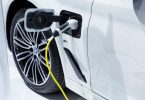The U.S. Department of Transportation wants to research the use of blockchain for highway administration.
The Federal Highway Administration (FHWA) is looking for proposals in three technical areas, blockchain being one, and anticipates about four to six contracts. It is offering a total of $4 million in funding for the proposed projects and may make multiple awards for a single requirement.
The announcement said FHWA would investigate blockchain for connected vehicle applications. It wants to explore several topics, including certificate management for vehicle-to-vehicle and vehicle-to-infrastructure solutions, to monitor traffic.
While the request does not go into detail, this might include vehicle identities such as the standard that the MOBI alliance has created and was led by Renault and Ford. For autonomous cars to monitor traffic and optimize routes, these sorts of applications are needed.
Next up is freight data management. Currently, blockchain firms are employing IoT devices to connect the physical world with the blockchain. The FHWA said the solution should provide the government secure, anonymized data about routing and timing for the pickup, transfer, and delivery of goods. This is to help with “policy and public investment decisions.”
The third use case relates to road asset information. For example, certain types of roads and construction have different traffic capacities. Some road surfaces might not tolerate heavy commercial vehicles. The FHWA said it wants a solution for optimizing routing or geofencing of roadway segments.
The final use case FHWA wants to explore is highway pricing. Some automakers and blockchain firms have already developed blockchain car wallets for toll payments. By using blockchain, the transport authority could integrate dynamic and auction-based methods for congestion charges or peak hour travel charges, especially for commercial vehicles, which could be encouraged to use highways and busy roads at night.






